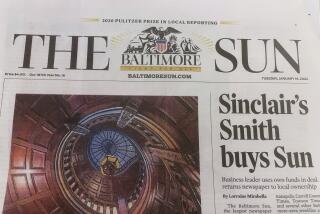Newsweek, Daily Beast wedding to merge something old, something new
- Share via
It’s a familiar story: A seemingly mismatched pair falls for each other and ties the knot while some look on hopefully and others hold their breath. The merger of Newsweek magazine and the Daily Beast website, announced Friday, is a classic May-December marriage.
Newsweek, 77 years old and recently purchased for a dollar by audio pioneer Sidney Harman, gets an infusion of energy and immediacy from the 2-year-old Beast and its irrepressible editor and co-founder, Tina Brown.
The Daily Beast, part of media mogul Barry Diller’s InterActive Corp., gets the gravitas, reach and stable platform of a venerable, though faltering, media icon. Harman and Diller will co-own the new Newsweek Daily Beast Co.
And Brown, a journalistic trophy if ever there was one, will be editor-in-chief of both. She will become the first female editor of Newsweek.
In an interview Friday with National Public Radio, Brown said the Daily Beast will become the digital operation of Newsweek, and Newsweek will continue in its printed form.
“It means that the Daily Beast’s terrific, young, vibrant team who’ve created this front line of news and adrenaline of the site, can also take that energy and have a different rhythm when they’re producing magazine articles,” Brown said.
Some are skeptical about the union.
“Newsweek is a sclerotic retiree, and Daily Beast is a debutante still finding herself,” said Henry Copeland, founder of Blogads, which creates and sells advertising on such sites as PerezHilton.com. “This won’t end well. Most likely Newsweek will slowly wither, and the Daily Beast will end up pushing it around in a wheelchair.”
A major cloud on the horizon: Neither entity is profitable. Advertisers have fled Newsweek, and circulation is down to about 1.5 million worldwide, from 3.1 million in 2007.
The symbolic price of $1 came with substantial debt; Newsweek’s 2010 operating loss is expected to be $20 million, according to a leaked copy of the memorandum circulated to potential Newsweek buyers by its seller, the Washington Post Co. The memo was posted in August by the Daily Beast, which aggressively covered the sale.
The future of Newsweek, the Daily Beast said at the time, “will depend on finding a near-genius editor and an inspired publisher and on their freedom and shared approach, as well as on their bankroll.”
Diller, who owns about 30 websites, will not disclose how much the Daily Beast has cost him, but has said he is using the site to find a model that can generate premium rates from high-end advertisers who are unaccustomed to paying print-like prices on the Web.
In the three months since Harman purchased Newsweek, the magazine has experienced an exodus of marquee talent.
The Daily Beast, for its part, has been able to attract many high-profile writers, some of whom are former political operatives willing to contribute for minimal pay in exchange for the glamour of being part of Tina Brown’s stable.
Journalism and advertising experts say it’s hard to say who benefits most from the merger (apart from Brown, who has received another round of national publicity).
The deal, said Steve Cohn of the Media Industry Newsletter, is a tradeoff: “Newsweek has better name; the Daily Beast has a better future.”
Both sides, he added, have little to lose: “No money changed hands, no shareholders to please. It’s potentially a nice win. And if it’s a loss, everyone will say ‘I told you so.’”
Alan Mutter, a new-media entrepreneur and former newspaper editor who teaches the business of journalism at UC Berkeley, thinks Newsweek could become edgier and more energetic while raising the Daily Beast’s profile.
“Newsweek’s business model is falling apart in this world where there’s so much immediate breaking news and interpretation online,” Mutter said. “Trying to reinvent it with a fresh editor who has a strong visual approach and a strong new-media approach is a bold experiment that could work. For Tina Brown, this is an opportunity to strut her stuff on a visible national stage and have the Daily Beast compete with Vanity Fair and the New Yorker.”
Yet the problem remains: niche magazines aimed at high-end readers, such as the Atlantic and the New Yorker, are profitable, while mass market magazines such as Newsweek are not.
Also, cautioned Tom Rosenstiel, director of the Project for Excellence in Journalism, “No one has got a model for monetizing content online.” Even the most popular online destinations in the country, he said, which are Yahoo, MSNBC, CNN and AOL, have not been able to make money from original content.
A former editor of Tatler, Vanity Fair and the New Yorker, Brown had a long, successful run before stumbling in 2001 with Talk, the first magazine she created from scratch. She took time off to write a best-selling biography of Princess Diana, then at Diller’s urging returned to journalism with the Daily Beast, which was launched a month before the November 2008 election.
Brown, 56, has frequently spoken about loving the higher metabolism of the web, but as she told NPR, “I am someone who has never kissed off the world of print.” Last year, she launched a Beast Books imprint with the publisher Perseus Books Group, aimed at getting short, topical nonfiction to market quickly. She has a contract to produce a biography of Hillary Rodham Clinton, though the fate of that book is unclear.
After Harman, 92, bought Newsweek in August, rumors began to swirl as he looked for a new editor that Brown was at the top of his list. The New York Observer reported in August that Brown was interested. On Oct. 18, Brown wrote on the Daily Beast that the “wedding” was “off.”
New York magazine reported that upon close reading of the deal, Harman had been unhappy with its terms, under which Brown and her business side counterpart, Daily Beast president Stephen Colvin, would not report to him but an independent board. (Colvin will be CEO of the new venture.) “I didn’t buy this magazine to be hands-off,” Harman told New York.
Still, the two sides began negotiating again in earnest, and according to Brown’s note on the site Friday, the deal was struck on Tuesday. “Some weddings,” she wrote, “take longer to plan than others.”
All three parties involved in the deal understand the pluses and minuses of high-profile marriages. Brown is married to former Random House editor Harry Evans. Diller is married to fashion designer Diane von Furstenberg. And Harman is married to Rep. Jane Harman (D-Venice).
Times staff writer Melissa Maerz in New York contributed to this report.
More to Read
The biggest entertainment stories
Get our big stories about Hollywood, film, television, music, arts, culture and more right in your inbox as soon as they publish.
You may occasionally receive promotional content from the Los Angeles Times.











